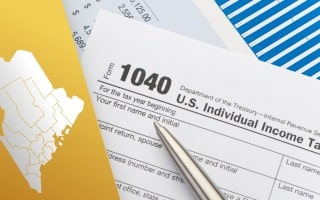Property Tax Records in Maine

The average property tax rate in Maine is around 1.09%, which is slightly higher than the national average. Taxes are typically assessed at the county level, which is why the average property tax rate varies depending on where you live. You must pay your property tax bill to your county assessor. Every county has its own assessor that collects tax bills and estimates property values.
In most counties, tax bills are sent out in two intervals, which occur in September and March. Your payments will be due by October 15 and April 15. However, most homeowners choose to pay their property taxes as part of their mortgage payments. If you take this approach, your annual tax bill will be divided into 12 separate payments.
Property taxes have been levied in Maine for most of its 204-year history. During that time, there haven't been many changes to Maine property tax laws. However, different governments propose changes from time to time. For example, Governor LePage proposed cutting the Homestead Exemption in 2017. This proposal was never passed.
Property Tax Assessment in Maine

The property taxes you pay every year are based on your home's assessed value, which differs from its market value. However, you need to know the market value to determine the assessed value. Local assessors can use several methods to identify a property's market value, the most common of which involves performing a mass appraisal to compare similar properties.
Let's say that your home has a market value of $200,000. In Maine, the assessed value of your home will usually equal 70% of the market value, which means that your property's assessed value will be $140,000.
Every county or city has its own tax rate, which is based on millage rates. A single mill is the equivalent of $1,000 in a home's assessed value. If your home has an assessed value of $140,000 and a mill rate of 25, your annual property taxes will amount to $3,500. Keep in mind that you can reduce your property taxes with exemptions. Maine offers a handful of these tax breaks. The average tax rates in the top Maine counties are:
- Cumberland County: 1.46%
- York County: 1.29%
- Penobscot County: 1.53%
- Kennebec County: 1.40%
- Androscoggin County: 1.65%
As you can see, property tax assessment in Maine doesn't vary much like in other states, and whether you live in a rural area or not, there isn't much variation, though Androscoggin County property tax rates are slightly higher than the rest of the state.
Calculate Maine Taxes
A Maine property tax calculator is a smart resource used by homeowners and real estate investors to better understand how property taxes are calculated throughout the state. This tool simplifies by allowing users to input key property details, such as location, property value, and applicable exemptions, to estimate their tax assessment and annual liability based on local municipal tax rates, which vary widely across Maine’s cities and towns.
A Maine property tax calculator can also help identify potential exemptions and tax relief programs. Maine offers several forms of tax relief, including the Homestead Exemption, which reduces the assessed value of a primary residence by up to $25,000. Additional exemptions are available for veterans, seniors, and individuals with disabilities, as well as the Property Tax Fairness Credit, which offers income-based relief for eligible taxpayers.
using our property tax calculator.
Maine Property Tax Records: What Are They?

When you pay your annual property tax bill, the county or city you live in will use the money to cover some of the costs within their budget. The public services that your property taxes pay for include the following:
-
Public works
-
City Hall services
-
Public library
-
Police department
-
Fire department
-
Schools and education
-
Parks and recreation
-
County services
-
Road Repair
If you're considering buying a home in Maine but want to be certain that it's worth the asking price, you can look through local Maine property records to find important information about the property. These records are available to the public and can show you how much taxes the owner pays and what the current market value of the property is. When you enter an address or parcel ID on your county tax assessor's website, you can view the following types of information:
-
Property location
-
Land use code
-
Utilities
-
Owner name
-
Assessed value and market value
-
Previous sales data
-
Year built
-
Square footage
-
Outbuildings
-
Detailed sketches
-
Assessment history
-
Photos
-
Map
-
Aerial view
-
Historical record cards
Property Tax Exemptions and Deductions in Maine

If you own a home or other type of property in Maine, you'll likely be able to reduce your home's assessed value with an exemption or deduction. Maine provides property owners with numerous exemptions, which include everything from a Homestead Exemption to a deduction for blind homeowners.
Some properties are fully exempt from taxes, which include real estate that's owned by school systems or governmental entities. Here's a list of the most common Maine property tax exemptions you might qualify for.
Homestead Exemption: If you own a home for one year or longer and live in the property, you likely qualify for the Homestead Exemption. This exemption reduces your home's assessed value by $25,000, which can lower your property taxes by a significant amount.
While this exemption is available to most homeowners, you don't automatically receive it. You must submit an application with your local assessor. To qualify for this exemption, the application needs to be submitted by April 1. If your form isn't filed until after April 1, the exemption will apply to the following year's tax assessment. Once you're approved for this exemption, you don't need to reapply every year.
Veteran Exemption: If you're a veteran who served in a branch of the military during a war period, you may qualify for this exemption. Keep in mind that you can still request this exemption if you already applied for the homestead one. To receive the exemption, you must meet one of the following criteria:
- At least 62 years old
- Become 100% disabled during service
- Receive 100% disability benefits as a veteran
If you qualify, this exemption will reduce your home's assessed value by another $6,000. The Maine Legislature also enacted an additional benefit for veterans in 2022. The Property Tax Fairness Credit is based on the amount of property taxes you pay. However, you must claim it on your individual income tax return.
Renewable Energy Investment Exemption: If you install renewable energy equipment in your home, you may be able to reduce your property taxes. You'll need to apply for this specific credit by April 1. Adding solar panels to your home would likely allow you to qualify for this exemption.
Paraplegic Veteran Exemption: If you obtained a federal grant that gives you access to a specially adapted housing unit, you can qualify for a $50,000 exemption.
Blind Exemption: To successfully apply for this exemption, you must provide proof that you're legally blind. If you can prove this disability, you'll receive an extra exemption that amounts to $4,000.
How To Search Property Tax Records in Maine

There are several methods you can use to find property tax records in Maine. Each of the 16 counties in Maine provides an online portal that the public can access if they want to search for property records. Some cities also offer online databases with new records that become available whenever properties are assessed. These records cover nearly every building.
If you're considering buying a home in Portland, Maine, the city offers an online database that allows you to search by address, owner, or parcel ID. If you only know the street name, you'll receive a list of properties. Keep in mind that these records are often printable.
You can also access public property tax records by using a third-party solution to perform your search. PropertyChecker.com is among the most popular tools for prospective buyers and investors. With this tool, you can get all the data you need to research a property and decide if it's worth the asking price.
Along with the property address, you can also search for tax records by inputting the owner's name or email address. If you know the parcel ID, you can get the information you're looking for without issue. The various types of documents that PropertyChecker provides when doing a Maine property tax records search include:
-
Neighborhood information
-
Historical sales
-
Deeds
-
Property owners
-
Loan records
-
Property Values
-
Property details
-
Lien records
-
Property tax records
-
Building permits
-
Previous foreclosures
How To Appeal Property Taxes in Maine

Property taxes aren't always accurate. If your annual tax bill has increased considerably, you can file an appeal with the assessor in your county. To win an appeal, you must prove that your property tax bill is higher than it reasonably should be. The assessor who calculated the value of your property will also be able to present evidence. Take the steps below if you need guidance during the appeals process.
Step 1: First, you must wait to get your assessment notice in the mail. Assessments are typically completed by April 1, which means that you should receive your notice in the following weeks.
Step 2: Before you appeal, you need to determine if your tax bill is excessive. Keep in mind that the specific valuation of your property doesn't matter. The amount of property taxes you're tasked with paying also won't factor into the appeal. Your main goal involves proving that the valuation of your existing property isn't reasonable when compared to the valuations of other comparable homes in your county.
Step 3: If you believe that your property valuation is too high, you'll need to appeal to the assessor via a written request within 185 days after you receive your assessment notice. This request should only include a statement that you're seeking an abatement. Take this time to describe why you believe you're entitled to one.
Step 4: If the informal review doesn't produce the result you're looking for, you can appeal to the Board of Assessment Review. You must submit this appeal within 60 days after you're notified of the assessor's decision.
Step 5: You can also appeal the Board of Assessment Review's decision with the Superior Court. If your property is valued at $1 million or higher, you'll need to appeal with the State Board of Property Tax Review.
How Property Tax Records Impact Real Estate Transactions in Maine

In Maine, property tax records play a significant role in many real estate transactions. Buyers can use property tax records to learn about the condition of the property as well as any renovations that have been done. They can also review the document to identify how much taxes the property owner has paid in recent years. Buyers often use historical data to calculate how much their monthly mortgage payments will increase because of taxes.
Sellers must also consider property taxes when listing their homes on the market. Let's say you're about to list your home for $10,000 more than its current market value. If the local real estate market is experiencing high buyer demand, you'll likely receive numerous offers for your home.
If, however, your county has a high property tax rate, buyers may not be willing to enter bidding wars and make offers that exceed the property value. The price of your home must be appealing enough to prospective buyers, which is why it's highly recommended that you consider the property tax rate.
Investors should also consider how property taxes will affect their purchases. When investors buy a rental property, they need to keep vacancy rates low and collect rent every month to maintain positive cash flow. If investors are saddled with high property taxes, they'll need to make sure that their expenses and mortgage payments don't exceed the income they bring in every month.
When a property owner fails to pay their property taxes on time, interest will accrue. If taxes remain unpaid for three years, the county can place a lien on the property, which means that the home can't be sold without paying the remaining taxes. Investors can bid on these liens during property tax sales, which can be hosted by counties or the state itself.
In Maine, you can't acquire a property solely by paying back taxes. However, a municipality can legally foreclose on a property if the homeowner doesn't pay their taxes within 18 months after the lien is placed. When an investor wins a bid for a property tax lien, they can collect the taxes and any interest that builds up. Most homeowners will pay their taxes to avoid foreclosure. If you successfully bid on a property, you'll need to pay all outstanding taxes within 30 days.
Free Maine Property Tax Lookup
Tax Records Please wait...
Property Tax Guide
- Property Tax Records in Maine
- Property Tax Assessment in Maine
- Maine Property Tax Records: What Are They?
- Property Tax Exemptions and Deductions in Maine
- How To Search Property Tax Records in Maine
- How To Appeal Property Taxes in Maine
- How Property Tax Records Impact Real Estate Transactions in Maine
Instant Access to Maine Property Records
- Owner(s)
- Deed Records
- Loans & Liens
- Values
- Taxes
- Building Permits
- Purchase History
- Property Details
- And More!
Free Maine Property Tax Lookup
Tax Records Please wait...
Property Tax Guide
- Property Tax Records in Maine
- Property Tax Assessment in Maine
- Maine Property Tax Records: What Are They?
- Property Tax Exemptions and Deductions in Maine
- How To Search Property Tax Records in Maine
- How To Appeal Property Taxes in Maine
- How Property Tax Records Impact Real Estate Transactions in Maine